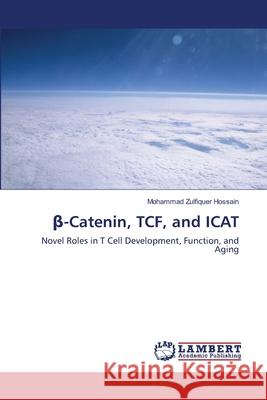β-Catenin, TCF, and ICAT » książka
β-Catenin, TCF, and ICAT
ISBN-13: 9783838334509 / Angielski / Miękka / 2009 / 196 str.
In addition to working together to drive expression of target genes, -catenin and TCF often work independently of each other. They both regulate several stages of T cell development, but their mode of action remains poorly understood. To study the specific role of -catenin-TCF interactions in T cells, we generated transgenic mice that express ICAT, a naturally occurring inhibitor of -catenin-TCF interactions, in the T cell lineage. We found that -catenin-TCF interactions are important for thymocyte survival, but not for proliferation or differentiation. Interestingly, thymocyte aging slows down in ICAT-Tg mice, suggesting a role for -catenin-TCF interactions in normal thymic involution. We also discovered that -catenin-TCF interactions provide survival signals to activated T cells and promote differentiation of activated CD4 T cells into the default Th2 lineage. However, TCF represses Th1 differentiation independently of its interaction with -catenin. This study, thus, provides novel insights into the role of -catenin and TCF in T cell development, function, and aging, and should of interest to immunologists, developmental biologists, and gerontologists alike.
In addition to working together to drive expression of target genes, β-catenin and TCF often work independently of each other. They both regulate several stages of T cell development, but their mode of action remains poorly understood. To study the specific role of β-catenin-TCF interactions in T cells, we generated transgenic mice that express ICAT, a naturally occurring inhibitor of β-catenin-TCF interactions, in the T cell lineage. We found that β-catenin-TCF interactions are important for thymocyte survival, but not for proliferation or differentiation. Interestingly, thymocyte aging slows down in ICAT-Tg mice, suggesting a role for β-catenin-TCF interactions in normal thymic involution. We also discovered that β-catenin-TCF interactions provide survival signals to activated T cells and promote differentiation of activated CD4 T cells into the default Th2 lineage. However, TCF represses Th1 differentiation independently of its interaction with β-catenin. This study, thus, provides novel insights into the role of β-catenin and TCF in T cell development, function, and aging, and should of interest to immunologists, developmental biologists, and gerontologists alike.











